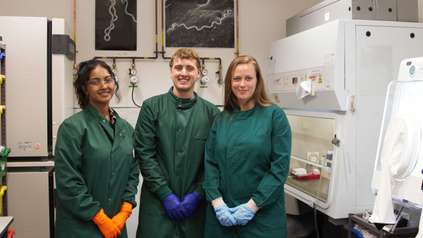Professor Nick Thomson appointed Head of the Parasites and Microbes Programme
Listen to this article:
Listen to “Professor Nick Thomson appointed Head of the Parasites and Microbes Programme” on Spreaker.
Nick Thomson is an experienced microbiologist and bioinformatician interested in bacterial genomics and evolution. His pioneering work focuses on the study of sexually transmitted and diarrhoeal diseases, such as syphilis and cholera, working with international collaborators to incorporate genomics to track and end outbreaks, as well as reduce the threat of future epidemics.
Starting at the Sanger Institute in 1999, he has also been a Professor of Bacterial Genomics and Evolution at the London School of Hygiene and Tropical Medicine since 2013. Additionally, in 2011 he became an Honorary Professor at the University of St Andrews in Scotland.
Nick’s research group at the Sanger Institute uses genomics to investigate how disease-causing bacteria evolve and spread. This research includes tracking genetic changes in bacteria over time, geography, or in response to therapeutic interventions such as vaccinations or the use of antibiotics to see how they adapt and spread.
Additionally, their research explores how bacterial genomes can be used to understand how bacteria cause infections, in both animals and humans, highlighting possible targets to stop these.
Another area that his group focuses on is understanding the mechanism of antimicrobial resistance by studying pathogenic and environmental bacteria, as well as host-associated microbiomes.
Nick’s research group also develops methods to access genome data directly from clinical samples without the need for culture. Culture-free techniques allow researchers and clinicians to study disease-causing microbes more quickly, and can inform better practice and clinical outcomes.
Looking forward, Nick will maintain global access and collaboration as a focus for the Programmes’ research activities. The teams within the Parasites and Microbes Programme, alongside many gifted scientists and organisations worldwide, will continue to collaborate and create long term self-supporting networks that allow us to deliver cutting edge science with global relevance. For example, the Parasites and Microbes Programme teams and international collaborators at icddr,b in Bangladesh secured Wellcome funding to establish a Climate and Health Hub – one of several sentinel research sites to be established within the coming decade to serve the population-scale ecosystem genomics.
“Over the coming decade, I look forward to implementing our vision for the future, taking a genomic approach that looks at the ecosystem as a whole. We will extend and continue to build our science with our collaborators worldwide to generate a deep understanding of the roles of microbes in human health and disease, and hopefully find new ways to prevent and treat the diseases they cause.”
Professor Nick Thomson, Head of the Parasites and Microbes Programme at the Wellcome Sanger Institute
“I sincerely congratulate Nick on his appointment to Head of the Parasites and Microbes Programme. His plan clearly outlines a pioneering vision that further builds on existing international partnerships between Sanger Institute and collaborators. These networks will carry out large-scale and impactful studies, learning together. I look forward to working with Nick as he takes the helm. I know the Programme will be driven by his enthusiasm, scientific curiosity and highly collaborative nature.”
Professor Matt Hurles, Director of the Wellcome Sanger Institute
As part of the future strategy for the Parasites and Microbes Programme, Nick aims to recruit new faculty to add to the existing strengths amongst current faculty, international fellows, and associate faculty.
The Programme has a strong history of translating research insights and establishing external partnerships to allow for innovation and product development. An example of this research translation that could positively impact lives worldwide is the announcement of the clinical trial phase for Microbiotica products, a Sanger Institute spin-out company that designs and develops unique live bacterial therapeutics and microbiome biomarkers for the treatment and management of disease. In addition, the Programme has used its data to inform policies linked to cholera control for the World Health Organisation and the design of vaccines critical for child health.





